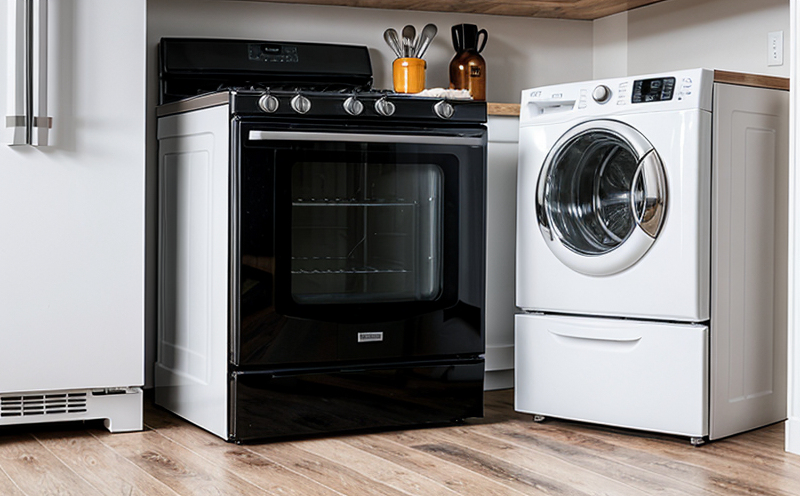Cooling Efficiency Testing of Refrigerators
Consumer Products & Product Safety Testing is a critical aspect of ensuring that household appliances meet the highest standards of safety and performance. Among these, refrigerators play an essential role in maintaining food freshness and preserving overall household health. Cooling efficiency testing is crucial to ensure that refrigerators operate at optimal levels while minimizing energy consumption. This service ensures compliance with international standards such as ISO 815:2008, which sets out the basic performance requirements for electrically operated domestic refrigerating appliances.
The testing process involves a series of rigorous steps designed to evaluate how efficiently a refrigerator maintains its internal temperature within specified limits. Specimen preparation is critical; this includes ensuring that the unit being tested operates under controlled conditions, free from external factors that could influence test results. The apparatus used in these tests includes sophisticated thermal measurement tools capable of detecting minute changes in temperature and power usage.
Testing begins with a baseline assessment where initial measurements are taken before any operational stress is applied to the refrigerator. This provides a reference point against which subsequent readings can be compared. Once this phase is complete, the actual cooling efficiency test commences. During this period, various load conditions are imposed on the unit to simulate real-world usage scenarios, such as different food storage quantities and types.
The data collected during these tests includes both quantitative metrics like power consumption figures and qualitative observations regarding temperature fluctuations inside the refrigerator compartments. These measurements help determine whether a particular model meets or exceeds the specified efficiency standards set forth by relevant international bodies.
Compliance with such regulations not only ensures consumer safety but also contributes positively to environmental sustainability efforts. By promoting energy-efficient appliances, we contribute towards reducing greenhouse gas emissions associated with electricity production. Moreover, efficient cooling systems translate directly into cost savings for consumers who own these products.
The results of these tests are meticulously documented and presented in comprehensive reports that highlight key findings alongside recommendations for improvement if necessary. These documents serve as valuable resources both for manufacturers looking to enhance their product offerings and regulators seeking assurance regarding market compliance levels.
Industry Applications
| Application Area | Description |
|---|---|
| Manufacturing Quality Control | Ensures consistent performance across all units produced, reducing defects and recalls. |
| Regulatory Compliance Audits | Demonstrates adherence to local and international standards ensuring safe product distribution. |
| R&D Innovation Support | Identifies areas for enhancement in design and functionality, leading to more advanced models. |
| Consumer Satisfaction Enhancement | Guarantees reliable performance that meets consumer expectations regarding food safety and freshness. |
| Type of Test | Description |
|---|---|
| Thermal Cycling | Evaluates how well the refrigerator withstands extreme temperature changes without compromising performance. |
| Voltage Variability Simulation | Assesses resilience against fluctuations in electrical supply, preventing potential damage to components. |
| Load Testing | Mimics typical household usage patterns to assess overall system efficiency under realistic conditions. |
Customer Impact and Satisfaction
Consumers benefit significantly from cooling efficiency testing in several ways. Firstly, it leads to safer appliances which reduce the risk of foodborne illnesses caused by improper temperature control within refrigerators. Secondly, efficient units consume less electricity, resulting in lower utility bills for users. Lastly, satisfied customers are more likely to recommend their products to others, fostering brand loyalty and goodwill.
For manufacturers, meeting cooling efficiency standards opens doors to broader markets where stringent regulatory requirements apply. It also enhances reputation by demonstrating commitment to quality and innovation. Compliance with international norms like ISO 815:2008 not only ensures that products meet specific criteria but also signals reliability and trustworthiness to potential buyers worldwide.
From a societal perspective, promoting energy-efficient refrigerators helps combat climate change by reducing carbon footprints associated with fossil fuel-based power generation. This aligns with global initiatives aimed at mitigating environmental impacts from consumer electronics.
International Acceptance and Recognition
The importance of cooling efficiency testing extends beyond national boundaries, gaining widespread acceptance across numerous countries adhering to international standards. Many nations have adopted similar guidelines based on ISO 815:2008, reflecting its global relevance.
Recognizing the significance of this service, various certification bodies incorporate compliance with these tests into their accreditation processes for manufacturers. This ensures that only those meeting stringent criteria receive recognition, thereby enhancing consumer confidence in purchasing decisions.
Moreover, adherence to such protocols fosters international trade by facilitating easier cross-border transactions between compliant entities operating within different regulatory frameworks. It simplifies regulatory processes and reduces barriers to entry into new markets, promoting fair competition among industry players.





